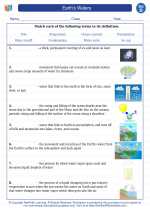Earth's Waters
Earth's waters refer to the vast bodies of water that cover the Earth's surface, including oceans, rivers, lakes, and other water sources.
Oceans
Oceans cover about 71% of the Earth's surface. There are five main oceans: the Pacific, Atlantic, Indian, Southern (or Antarctic), and Arctic Oceans.
Rivers and Lakes
Rivers are large, flowing bodies of water that usually empty into a sea or ocean. Lakes are bodies of water surrounded by land. Both rivers and lakes play important roles in the Earth's water cycle.
Water Cycle
The water cycle is the continuous movement of water on, above, and below the surface of the Earth. It includes processes such as evaporation, condensation, precipitation, and runoff.
Importance of Earth's Waters
Earth's waters are essential for all forms of life. They provide habitats for countless organisms, regulate the Earth's climate, and are used for various human activities such as agriculture, transportation, and recreation.
Study Guide
- What percentage of the Earth's surface is covered by oceans?
- Identify the five main oceans.
- Explain the water cycle and its key processes.
- Discuss the importance of Earth's waters for ecosystems and human activities.
◂Science Worksheets and Study Guides Fourth Grade. Earth's Waters

 Study Guide
Study Guide
 Worksheet/Answer key
Worksheet/Answer key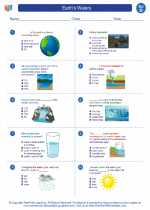
 Worksheet/Answer key
Worksheet/Answer key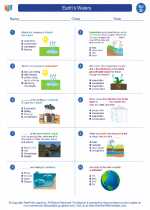
 Worksheet/Answer key
Worksheet/Answer key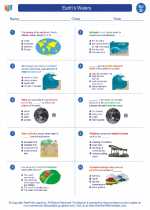
 Vocabulary/Answer key
Vocabulary/Answer key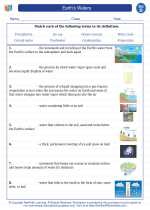
 Vocabulary/Answer key
Vocabulary/Answer key